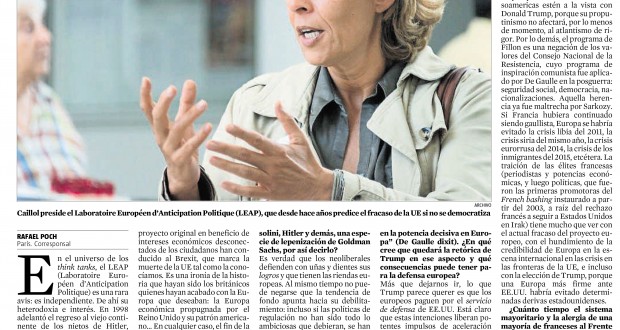LEAP is proud to share with you the interview of Marie-Hélène Caillol (President of LEAP and AAFB), conducted by Rafael Poch, correspondent in Paris for the Spanish newspaper LA VANGUARDIA. This article is also available in Spanish here!
Is this multicrisis EU fixable, or does it have to be demolished in order to be rebuilt?
There is no need to destroy the EU. It has already been done. Thirty years of complete diversion from the original European construction project in favour of so many exclusively economic interests, disconnected from that of the European citizens; all this has resulted in the Brexit affair, which signed the death of the EU as we knew it; isn’t it ironic, from a historical point of view, that it is the British who put an end to the Europe they wanted? Indeed the drifts summarised above are essentially linked to the vision of an economic Europe conveyed mainly by the UK and its American sponsor. In any case, the end of the EU as we knew it does not mean the end of the European construction project; the latter is actually being liberated, for better or for worse, from the EU model implemented in 1992 within the Treaty of Maastricht.
You warned several years ago against the transformation of the European Community into a Union, and you say that the tangle of the European crisis actually began in 1992. Could you please elaborate?
In 1992, it was the Treaty of Maastricht that was supposed to finalise the process of economic integration and should therefore have opened the era of political and democratic integration. Total failure! Maastricht was the Treaty which greatly increased the budget and the areas of competence of Europe and should have imposed a complete change of method of governance based on the assertion of the following principles: transparency, efficiency and democratisation (Franck Biancheri called it “TED”, back in the 90s). Failure! Along with the increasing responsibilities, there is the change of project name: from “European Community” to “European Union”. Simply think of Soviet Union, United States, United Kingdom, … and you will understand why Franck Biancheri in 1992 warned against risks of drift away from to the principles enunciated by the Founding Fathers: particularly, the putting in common of wealth (coal and steel pooled within the framework of the ECSC; which was abandoned since), respect for diversity, including linguistic one (the European institutions, disconnected from citizens, speak only English), and balance and complementarity between supra-national level and member-states (instead of the EU war against member states, in association with the neo-liberals … a lost battle moreover, as the states are still the top of the democratic pyramid and therefore remain the masters of the European peoples, as is currently illustrated). The only way to create harmony between European and national levels was to democratise the first one. This would have strengthened instead of weakened the national democracies. That said, from this point of view, the responsibilities of the failure of European democratisation are well shared between a European level – which was happy to avoid the question of peoples – and national political systems – clinging to their privileges and blocking any idea of the emergence of a European political class other than this dysfunctional combination of national political classes. Three deviating axes from 1992 on, for a complete derailment in 2016. Today, Europe is reinventing itself and the populists are one step ahead of the people … despite all the warnings made by Franck Biancheri for more than 30 years.
The neo-liberal crisis, so obvious since 2008, does not prevent that its ideology continues to dominate. How long will it last? Do you think we are moving towards a synthesis between the neo-liberal programme and the authoritative populism of the grandchildren of Petain, Horthy, Mussolini, Hitler and others? A sort of “lepenisation” of the Goldman Sachs, so to speak?
The signals from this point of view are contradictory. Certainly, the neo-liberals are defending tooth and nail their “property” … and they are well placed for this, everywhere in Europe. At the same time, it should not be denied that the heavy trend is in fact their weakening: even though regulatory policies have not always been as ambitious as they should have been, they have nevertheless been present (the City is nothing more than the shadow of what it was 10 years ago; the banks though reluctant are obliged to obey and implement principles of capitalisation, security and regulation). The States have taken over the management of the continent, hence the divergences between Germany and Greece over the Greek crisis; between the Visgrad group and Germany over the migrant crisis, etc. And these rising nationalist populisms are a sign that member states are taking control and that the European construction is re-politicising itself. Two important remarks on this subject: on the one hand, the nationalist populists will all end up acting at European level, contrary to what their electors believes … because they are politicians above all, and true politicians seek real levels of power … the European power; on the other hand, this apparent “alliance” between neo-liberals and populists indicated by certain aspects of Trump’s speech for example, is, in our view, a “real-politik” effect: those populists have no chance to come to power without making concessions to the “system”; but nevertheless they are formatted to create change, again “for better or for worse”.
Denying NATO from Washington tower means the abandoning of the “main instrument making the United States the decisive power in Europe” (de Gaulle dixit). What will be, in your opinion, the practical consequences of Trump’s rhetoric on this aspect, as well as the consequences for the “European Defence” project?
First of all, there is the tremendous uncertainty between what Trump said or hinted and what he will actually do. Once elected, he announced that he was abandoning the TPP … but he was careful not to speak of the TTIP. As for NATO, above all he wishes to make the Europeans pay for the “US defense service” more than letting them go. In a way, the ball is in the European court. Clearly those intentions are releasing powerful accelerating energies for the European Defence project. But are the Europeans really ready? Nothing is less certain and if we are not, we might have no choice but pay and therefore reinforce our involvement in NATO, reversing the disengagement tendency of the past decades (up to the Euro-Russian crisis of 2014 in any case). But if the Europeans pay more, they could also gain influence. There are plans to take NATO as a starting point for a European Defence by separating the European and American commands. In conclusion, we have identified three successive steps: present to mid-2017, a great mobilisation around the project of the European Defence; 2017 to 2018-2020, a tightening of the transatlantic strategic link (“since there is nothing better”) – and with great risks over this period; then from 2018-2020 on, the finalisation of the project of European strategic independence. In the end, Trump opens the way to this independence; yet the road may be winding.
Michael Moore, who predicted Trump’s victory, says Trump will not finish his term. Can the United States enter a period of internal turbulence? In case it will, what effects could we anticipate for Europe?
As far as we are concerned, it was in the case of a Clinton victory that we anticipated risks of turbulence (with a risk of civil war linked to the taking of weapons of the disappointed electorate of Trump … who also happens to represent this fringe of population armed to the teeth). Trump’s victory, meanwhile, can lead to street movements but, with a tough regime, these movements will soon be silenced, just as the Internet world will be placed under strict surveillance, a trend which has already begun … and not only in the US. The “nice black lefties” of the street are much less dangerous than the militias of the Mid-West … hence Trump’s victory … because the US establishment was afraid of the consequences of a Clinton victory (remember that only 25% of the US electorate voted Trump which is therefore not a democratic choice). The trends we are describing in terms of tighter control of populations in the United States will have a mirror effect in Europe. But we anticipate that the European population, much less isolated than the Americans, will better resist this control and will be better defended by national democracies (more central in the European political edifice than the democracies of the states in the US). Generally speaking, we analyse that the presidency of Trump will allow Europeans to become aware of their difference when compared to the Americans and thus contribute to the ideological and geopolitical rebalancing of Europe. For example, where a Trump had only to let go of vulgarity, racism, provocations, verbal violence, and so on, the European populists with a few exceptions (in Anglo-Saxon countries, such as the UK or the Netherlands) are obliged to water down their tone if they really run for victorious elections.
The candidate of the right wing to the presidential election, François Fillon, uses a Gaullist tone. What remains of the Gaullism in France?
Yes, Fillon has had the courage to strongly demand the rapprochement with Russia and his declarations in favour of a firmer attitude towards the United States evoke the principles of independence of a De Gaulle. On the Russian question we have not ceased to say that Europe must absolutely revive ties with Russia; even though we are also conscious (because we often had to differentiate ourselves from it) that such a position was also characteristic of the far-right speech. Which camp does Fillon really belong to from this point of view? This is a serious question. As for the United States, it is good for Fillon that prospects for American-Russian easing are in sight with Trump’s pro-Prutinism no longer hurting transatlantic rigour (but for how long?). Besides, Fillon’s programme is a negation of the values of the National Council of the Resistance (whose programme of communist inspiration was applied by De Gaulle after the war: social security, democracy, nationalisation, etc.) already attacked by his former boss, Nicolas Sarkozy (anti-lights, anti-NCR …). If France had remained a Gaullist state, Europe would have avoided the Libyan crisis of 2011, the Syrian crisis of the same year, the Euro-Russian crisis of 2014, the migrant crisis of 2015, etc. If France had remained a Gaullist, the world would have noticed it. The betrayal of the French elite (journalists and economic and political powers, who were among the main singers of the French-bashing stance established since 2003 in the wake of the French refusal to follow the Americans in Iraq) counts for a lot in the current failure of the European project; in the collapse of Europe’s credibility on the international stage; in the crises at the EU’s borders … and even in Trump’s election (because a stronger Europe facing the United States would have avoided certain drifts).
How long will the majority system and this large scale French allergy towards the National Front and Mrs. Le Pen will continue to prevent her victory in a presidential election?
At least 5 more years … according to us … and only because Fillon was sent to “steal the spotlight”! We have long analysed that the risk we run in Europe is less the victory of populist candidates than the inclusion of populist agendas in our governments. In England, the UKIP wins a referendum but it is the right wing of the very frequentable Tories that took the power. In France, our establishment invents the impeccable republican Fillon … The European antibodies against dictators are powerful but the elite’s ability to betray their peoples is still extremely efficient. It is an era of Petains more than Hitlers which begins in Europe … as long as the community of European peoples has not found a way to make their voice directly heard.


 LEAP2040 Toutes les informations et archives Europe2040
LEAP2040 Toutes les informations et archives Europe2040



